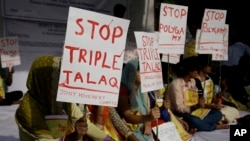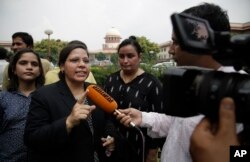In a judgment that is being hailed as a huge victory for India’s Muslim women, the country’s Supreme Court has ruled that the controversial practice of instant divorce is unconstitutional and un-Islamic.
“Triple talaq” as practiced in India, allowed Muslim men to unilaterally divorce their wives by saying the word “talaq,” or divorce, three times.
A panel of five judges representing India's major faiths -- Hinduism, Christianity, Islam, Sikhism and Zoroastrianism, delivered the landmark verdict by a 3-2 majority on Tuesday.
The judgement said that triple talaq was "not integral to religious practice and violates constitutional morality." They said it was arbitrary to allow a man to "break down marriage whimsically and capriciously.”
Muslim clerics however had staunchly opposed overturning “triple talaq” saying that although the practice was undesirable, it was sanctioned by the Quran and courts could not interfere in matters that pertain to religion.
Zafaryab Jilani of the powerful All India Muslim Personal Law Board said the consequences of the court decision remain to be seen. “How far it will help the women, how far it will go against them?” he told a reporter.
Many Muslim clerics and leaders have called the campaign to overturn the practice a political ploy by the Hindu nationalist Bharatiya Janata Party to take away Muslim identity.
PM Voices Support
Prime Minister Narendra Modi has voiced support for putting an end to the Muslim divorce practice, saying it is necessary to correct an injustice to Muslim women.
The country’s Minister for Women and Child Development, Maneka Gandhi, called it an important step forward. “Traditions are not set in stone and have to change with times and the time has come to give women equality,” she said.
In India, which has a secular constitution, each religion is allowed to have separate laws governing marriage, succession, adoption and maintenance. Muslims are the country’s largest minority and have long said the court cannot interfere in these matters.
Abrupt end of marital life
In recent years, there had been growing complaints from Muslim women that three brief words, “talaq, talaq, talaq,” abruptly ended their marriage via conversation, letter, phone messages and WhatsApp, giving them no voice in an important decision.
The co-founder of the Indian Muslim Women's Movement, Zakia Soman, told VOA that it was a happy day for muslim women who have suffered for the last 70 years. “The expectations of thousands of women were associated with this (case). So many have been been eagerly awaiting to hear something positive from the Supreme Court.”
But she says the ruling marks just the beginning of a long battle for a social reform movement and gender justice for Muslim women in a range of areas such as property and inheritance rights and age of marriage of girls.
“Its not now that everything is done. Armed with this judgment and some kind of legal prptection, at least the mindset about legal rights for Muslim women has become accepted”, she said.





